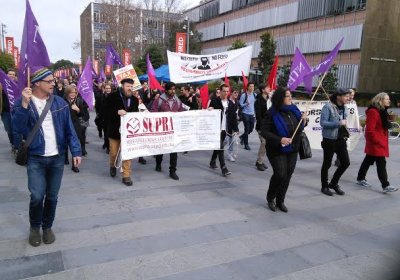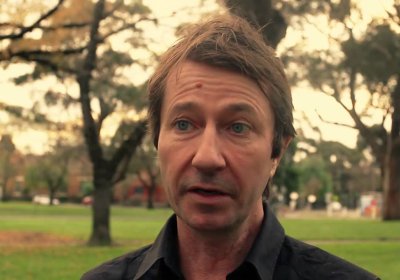Public disgust at Bronwyn Bishop's $5000 helicopter ride from Melbourne to Geelong is entirely justified. However, Tony Abbott's “root and branch” review of politicians' “entitlements” is designed to whitewash, not solve, the problem. After all, it is not as if we haven't had “root and branch” inquiries into politicians' entitlements before.
1064
 Anti-water charge protests in Letterkenny, County Donegal on November 1.
The Irish government’s unpopular public utility, Irish Water, has been dealt a body blow. It failed two key tests within the space of a fortnight — gifting a huge victory to opposition parties and the huge anti-water charges movement.
Anti-water charge protests in Letterkenny, County Donegal on November 1.
The Irish government’s unpopular public utility, Irish Water, has been dealt a body blow. It failed two key tests within the space of a fortnight — gifting a huge victory to opposition parties and the huge anti-water charges movement.
The Sydney University National Tertiary Education Union (NTEU) organised a rally in trying weather conditions on Wednesday 5th August. They were joined by lively contingents from the Student Representative Council, Sydney University Postgrad Student Association, Socialist Alliance, Socialist Alternative, Greens members and staff from a variety of departments.
Kyol Blakney, SRC president gave an acknowledgement of country and condemned the corporatism of universities.
Activists are hoping that a bill to tighten the rules governing unconventional gas exploration and production in New South Wales will pass the Legislative Council on August 13.
Such is the groundswell of opposition to this part of the fossil fuel industry, a Greens Bill has support from NSW Labor and a couple of small right-wing parties.
Greens MP Jeremy Buckingham told Green Left Weekly that he expects the Bill to pass, with amendments proposed by Labor.
For a long time, superannuation was available only to permanent public sector workers and managerial employees in the private sector. So-called “blue collar” workers were not so privileged. In the mid-1980s, only about a quarter of these workers had access to superannuation, more often than not following union-led campaigns in targeted industries.
Over the past few decades there has been a rapid growth of interest in buying food that does not come from large-scale industrial farms. Concerns exist over their use of large amounts of commercial fertilisers, pesticides and genetically modified organisms, and inhumane treatment of farm animals.
Victoria Police announced on August 6 they had arrested and charged a 38-year-old man in connection with death threats made against Socialist Party councillor Steve Jolly, from Yarra Council in Melbourne’s inner north. The threats referred to Jolly’s prominent role in mobilisations countering the far right Islamophobic groups Reclaim Australia and United Patriots Front (UPF).
The Papua New Guinea Supreme Court has declared an inquiry into the Manus Island detention centre null and void because of perceived bias.
The court unanimously decided that Justice David Cannings, who started the inquiry, could not, according to PNG law, also preside over the proceedings. He also failed to disclose that an expert witness was his friend.
When Tony Abbott’s government asked the Productivity Commission to review Australia’s “workplace relations framework” it was for the sole purpose of providing it with cover for more attacks on workers’ pay and conditions.
One of its terms of reference was to examine the ability that employers had to “flexibly” manage and engage with their employees.
Flexibility is a word that once commonly conveyed a positive sense of resourcefulness and adaptability. But the notion of flexibility that the Productivity Commission refers to is one shaped by employers.
The midnight text message that sacked 100 workers — this is the face of Australian industrial relations today.
Workers at Hutchison Ports in Sydney and Brisbane received their marching orders by text and email overnight on August 7, informing them that their positions had been made redundant, there were no redeployment opportunities and their personal belongings would be couriered to them.
Thousands braved heat and no shade to rally and march in Newark, New Jersey, on July 25 and police brutality, racial injustice and economic inequality.
A meeting of trade ministers in Honolulu, Hawaii, over July 28 to 31, failed to reach final agreement on the Trans-Pacific Partnership (TPP) free trade deal.
The TPP is a free trade deal being negotiated by countries on the Pacific rim: the US, Australia, Singapore, New Zealand, Chile, Brunei, Canada, Malaysia, Mexico, Peru, Vietnam and Japan. These countries represent about 40% of global GDP.
Key stumbling blocks were over protectionist policies. The US, Mexico and Japan could not find agreement over cars, and the US and Japan disagreed on dairy.
- Previous page
- Page 2
- Next page









